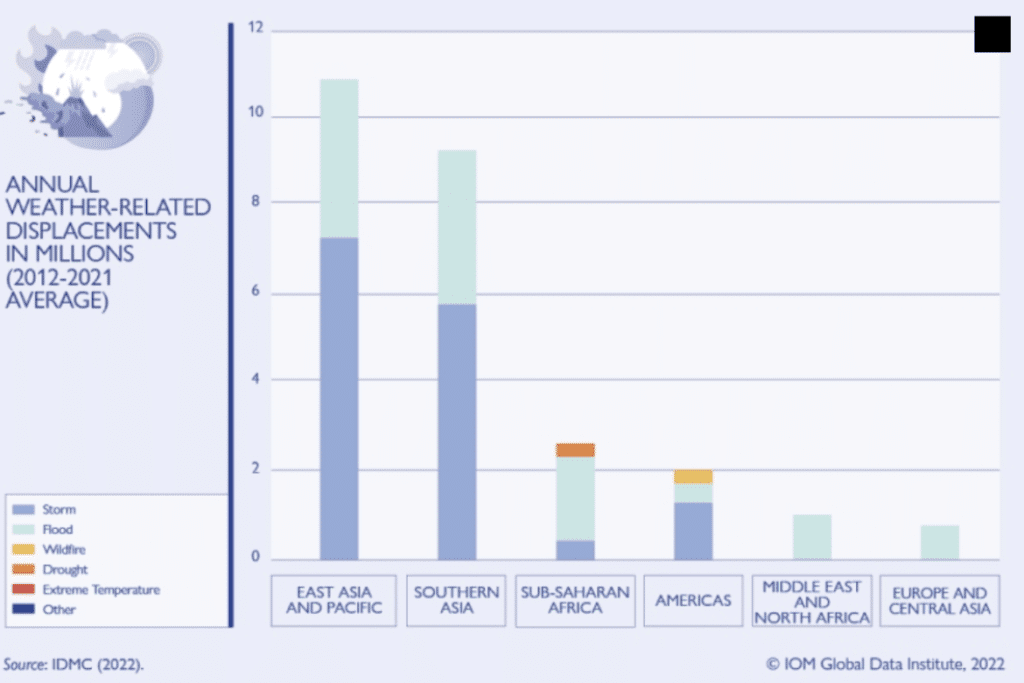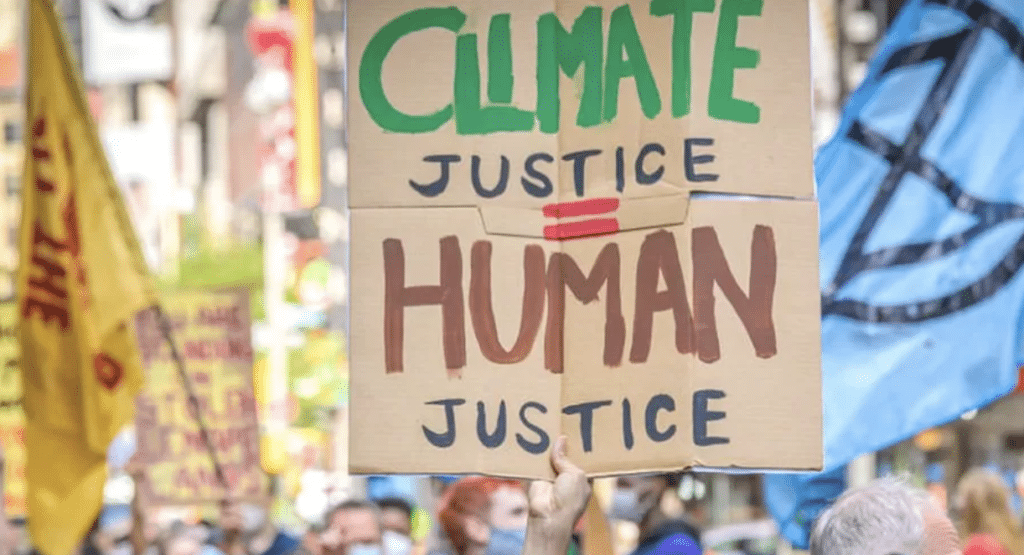Greta Thunberg famously said, “It is the suffering of the many which pay for the luxury of the few.”
This statement holds true in the context of climate change, where the consequences of our actions are unequally distributed. While every country in the world is affected by climate change – yet, its impact is far from equal.
Via this article, UR sheds light on the fundamental opportunity we have to extend our sense of responsibility and care beyond national borders – toward the global community. We must finally recognize that we are all connected and that the actions we take in one part of the world can have a ripple effect on the lives of others. Today, it is imperative that we put aside our differences and work towards a common goal – a sustainable future for all.
Climate change is unequal
Understanding the interrelationship between climate change and our society is crucial for addressing this complex problem. Our power imbalances and exploitative tendencies have led to the strong unequal effect of climate change – disproportionally affecting the most vulnerable communities who are deprived of their most basic need as water, food and clean air.
To understand the impact of this injustice we can have a look at these 2 maps of Earth’s rise.
- The red in the first map shows countries that created the most carbon emissions – in other words, contributed the most to climate change.
- The red in the second map shows the countries that are the most vulnerable to climate change.
One can see that these maps are, almost, directly inverted.


As stated by Fatima Ibrahim, Co-executed of the Green New Deal UK, “the success and development of the global north have come to the fate of the global south – we have literally dug up resources, and exploited communities to build ourselves kingdoms in the north. That has contributed to climate change and what we have left the global south with, is runaway climate change – without the resources to tackle it and save their communities”
Undeniably, climate change is rooted in human injustice, with vulnerable groups such as black individuals, people of colour, women, and indigenous populations being at the forefront and most affected by the consequences of climate change. Nations located along the equatorial band of the planet in the global south, particularly in Africa, South America, and Southeast Asia, are bearing the brunt of climate change’s impacts.
One of the main impacts on these countries is the increase in extreme weather – ultimately creating further scarcity when meeting their basic need such as the accessibility to food, water and health care. For instance, a growing number of droughts lead to crop failures and increased famines, while floods devastate both people and essential infrastructure. Additionally, extreme changes in temperature and rainfall patterns create ideal conditions for the transmission of diseases such as malaria and dengue fever.
Moreover, these communities are not only the least responsible for the climate change impact, but they are also the least prepared to cope with environmental devastation. Often, these communities lack the necessary resources and infrastructure to confront the effects of climate change, such as access to clean water, healthcare, and emergency services. Meanwhile, the affluent’s consumption patterns and lifestyles, which have a much greater carbon footprint, continue to exacerbate the climate crisis.
Looking at our history
In order to comprehend the intricacies of climate change and its association with our society, it is crucial to examine the historical dynamics that continue to give rise to contemporary unsustainable and inequitable practices.
Colonialism and slavery were two factors that significantly shaped the world as it exists today. During this time, the exploitation of resources and labour established the foundation for the modern global economy. In particular, the exploitation of fossil fuels, such as oil and gas, played a crucial role in the development of the industrial revolution. As factories and machines began to consume fossil fuels on a massive scale, the industrial revolution resulted in a massive increase in carbon emissions – substantially contributing to the current climate crisis.
Unfortunately, this is not the extent of the relationship between our society and climate change. Colonialism and slavery have created a world in which systemic injustices are still profoundly embedded in our society. This encompasses what is known as “environmental racism”.

Environmentalism racism refers to the disproportionate impact of environmental issues, such as climate change, on people of colour, indigenous, etc. This is because many communities of colour are situated in regions that are more susceptible to environmental hazards, such as flooding or pollution. These communities are often marginalized and lack the resources to adapt to the impacts of climate change. This dynamic has been perpetuated by policies and practices that have prioritised the interests of the wealthy and powerful over those of the most vulnerable.
Environmental migration
One of the most disastrous aspects, among others, in the context of climate change is the lack of intervention for nations which are the most capable of mitigating global challenges. We are seeing a widespread tendency where the countries most responsible for our climate crisis, are turning a blind eye to the needs of the most vulnerable communities and instead implementing policies that primarily benefit their citizens in the short term.
The effects of climate change have caused what is now referred to as “environmental migration,” which is defined by the International Organization for Migration (IOM) as the “movement of persons or groups of persons who, predominantly for reasons of sudden or progressive changes in the environment that adversely affect their lives or living conditions, are forced to leave their places of habitual residence, or choose to do so, either temporarily or permanently, and who move within or outside their country of origin or habitual residence”.

The latest report from the Internal Displacement Monitoring Centre (IDMC) GRID indicates that of the 38 million internal displacements recorded in 2021, 23.7 million were caused by disasters. At the end of 2021, at least 5.9 million individuals in 84 countries and territories were living in displacement due to disasters that occurred not only in 2021 but also in previous years.
The Intergovernmental Panel on Climate Change (IPCC) warns that more than one billion people worldwide may be exposed to coastal-specific climate hazards by 2050, potentially leading tens to hundreds of millions of people to leave their homes in the coming decades. The high number of environmental migrants is alarming, but it is the failure of wealthier nations to assist those in need that is of greater concern. According to the Overseas Development Institute, only 16 per cent of international climate finance between 2008 and 2015 was allocated towards adaptation measures to help vulnerable communities cope with the impacts of climate change.

Unfortunately, few international, regional, and domestic legal frameworks currently exist to adequately protect climate migrants. According to the UN Dispatch, report that people who have been uprooted because of climate change exist all over the world – even if the international community has been slow to recognize them as such”. As a result, climate migration has been described as “the world’s silent crisis” – contrasting its global pervasiveness with its lack of recognition and investigation”.
Instead of uniting to address our current environment, it is regrettable to witness that many nations have chosen to close their borders and adopt nationalistic policies. This decision denies individuals who are already suffering from the effects of climate change access to safer and more stable living conditions – further exacerbating the problem.
Moreover, the unfair exploitation of resources only compounds the issue – strengthening power imbalance and the difficulty of vulnerable communities to survive and thrive in the face of climate.
Climate Justice
Climate change cannot be solely addressed from an environmental standpoint, as it is intricately linked to deeply rooted unjust and divisive practices that have resulted in systemic injustices. Therefore, the solution to our present-day dilemma lies in extending our sense of responsibility and belonging as part of a unified civilization. This would require confronting our problematic history and making reparations to commit to a more equitable future for the planet and all its inhabitants.
In the context of climate, this approach is translated into the term “Climate justice”. Earthrise has defined climate justice as “a human-centred approach to tackling climate change whilst addressing the many intersecting issues that created it”.
Climate justice is a holistic approach that recognizes the interconnected systems of capitalism, resource extraction, labour exploitation, and environmental degradation that contribute to climate change. It examines the capitalist economic system that prioritizes profit and growth over environmental and social concerns, leading to the overexploitation of natural resources like fossil fuels.

To deliver climate justice, environmental policies need to encompass racial justice, human right, racial justice and gender equality. This can only be accomplished through the implementation of an inclusive model of governance that involves the most affected and concerned groups in the policymaking process, listens to their concerns and ideas, and empowers them to take action. This approach also involves investing in programs that address specific needs and provide tangible resources for adaptation and resilience.
The principle of climate justice reinforces the fact that advancements in technology and governmental policies when leveraged solely for individual gain, will impede our collective survival on this planet. The tenets of evolution are at odds with the notion of injustice, which perpetuates societal oppression and impoverishment, particularly for those who are most susceptible.
Despite our current difficulties, climate change represents an opportunity in disguise – one that could foster a deeper understanding of our interdependence and facilitate systemic amendment at both the domestic and international levels, tackling the underlying causes of this phenomenon and promoting the ideals of sustainable development.
Sources
Atmos, IPCC Reports, ‘Yes, Colonialism Caused Climate Change’ (2022) https://atmos.earth/ipcc-report-colonialism-climate-change/
Adger, N., Paavola, J., Huq, S. and Mace, Cambridge, Fairness in Adaptation to Climate Change, (2006)
Bachram, H., “Climate fraud and carbon colonialism: the new trade-in greenhouse gases, Capitalism, Nature, Socialism” (2004) doi: 10.1080/1045575042000287299
Dooley, Kate; Holz, Christian; Kartha, Sivan; Klinsky, Sonja; Roberts, J. Timmons; Shue, Henry; Winkler, Harald; Athanasiou, Tom; Caney, Simon; Cripps, Elizabeth; Dubash, Navroz K. “Ethical choices behind quantifications of fair contributions under the Paris Agreement” (2021)
Nikkei Asia, “Climate refugees: The world’s silent crisis” (2022) https://www.google.com/url?q=https://asia.nikkei.com/Spotlight/Datawatch/Climate-refugees-The-world-s-silent-crisis&sa=D&source=docs&ust=1682682818261827&usg=AOvVaw1phprnP_m2hJZ1roPmTVaU
Earthrise, “Climate Justice is Social Justice” (2022) https://www.youtube.com/watch?v=jY2eWJ-U_VQ&t=455s
Migration data portal, https://www.migrationdataportal.org/themes/environmental_migration_and_statistics
Internal Displacement Monitoring Center (IDMC), “Global Report on Internal Displacement 2022” (2022) https://www.internal-displacement.org/global-report/grid2022/
UN, “Let’s Talk About Climate Migrants, Not Climate Refugees” https://www.un.org/sustainabledevelopment/blog/2019/06/lets-talk-about-climate-migrants-not-climate-refugees/
Vidal, John, The Guardian. “Global warming could create 150 million climate refugees by 2050”. The Guardian (2009)
Curtis, Kimberly, UN Dispatch “Climate Refugees,” Explained” (2020)
Global human rights, Climate Justice, https://globalhumanrights.org/what-we-do/climate-justice/